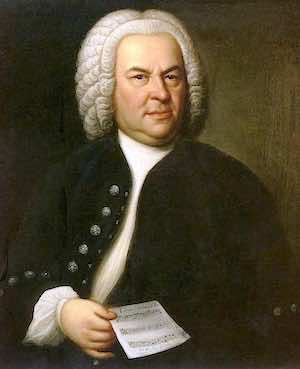Top > Musicians Related to C.P.E. Bach > J.S. Bach (Sebastian)
This site introduces unknown composer Emanuel Bach (C. P. E. Bach). This English version was translated from Japanese one by ChatGPT.
Johann Sebastian Bach
Johann Sebastian Bach (1685–1750) was a composer representing German Baroque music and is one of the most significant figures in the history of music. He was active mainly as an organist, composer, and music educator, reaching the pinnacle of Baroque music.
Born into a musical family, Bach excelled in keyboard instruments and composition from a young age. He held various positions as an organist and music director in Weimar, Köthen, and Leipzig. Particularly during his time in Leipzig, he served as the Cantor of St. Thomas Church, dedicating himself to composing and teaching church music.

Bachʼs music is characterized by intricate compositional techniques utilizing counterpoint and profound spirituality. His works include church music such as cantatas, passions, and masses, as well as secular music like keyboard compositions, chamber music, and orchestral works. Notable examples include the *St. Matthew Passion*, *Brandenburg Concertos*, *The Well-Tempered Clavier*, and *The Art of Fugue*.
During his lifetime, Bachʼs music was appreciated mainly by a select group of specialists. However, from the late 18th century onward, especially after Mendelssohnʼs revival performance of the *St. Matthew Passion*, his music underwent significant reevaluation. Today, Bachʼs works are considered the pinnacle of both technical mastery and expressive depth, influencing all musical genres.
Bach fathered 20 children, several of whom also achieved success as composers. Notable among them are Wilhelm Friedemann, Carl Philipp Emanuel, Johann Christian, and Johann Christoph Friedrich.
Sebastian Bachʼs music laid the foundation for music theory and education, profoundly influencing later composers such as Mozart, Beethoven, and Chopin. His works continue to be performed and studied worldwide. Bachʼs music, with its universal beauty and profound spirituality, transcends time and remains beloved across generations.
Site search by Google
Upper< Lower> items
< Musicians Related to C.P.E. Bach> Arrangement from Brandenburg Concerto to Keyboard Concerto
> Beethovenʼs Studies and Haydnʼs Instruction
> Comparison of the Importance of Emanuel and Sebastian Bach
> Descendants and Ancestors of J.S. Bach
> Differences Between Rameau and J.S. Bachʼs Music
> Education by J.S. Bach for His Son Wilhelm Friedemann
> Education of Sons by J.S. Bach
> Harmony in J.S. Bachʼs Music
> J.S. Bach and the Empfindsamer Stil
> J.S. Bachʼs Fantasia and Fugue BWV 906
> J.S. Bachʼs Music Collection
> Keyboard Concertos (Piano Concertos) by J. S. Bach
> Melody and Harmony of Sinfonia 9-BWV795
> Music Publishing by C.P.E. Bach of J.S. Bachʼs Works
> Organ Works of C.P.E. Bach
> Sinfonias and Inventions of Sebastian Bach
> The Art of Fugue and Chromatic Melodies
> The Children of J.S. Bach Who Did Not Become Composers
> The Dispersal of Bach and Telemannʼs Scores
> The Foreign Stays of Bach and His Sons
> The Influence of Scarlatti on J.S. Bach
> The Relationship Between J.S. Bach and Telemann and Their Musical Styles
> The Use of Modes by J.S. & C.P.E. Bach
> Wohltemperierte Klavier and Its Translation